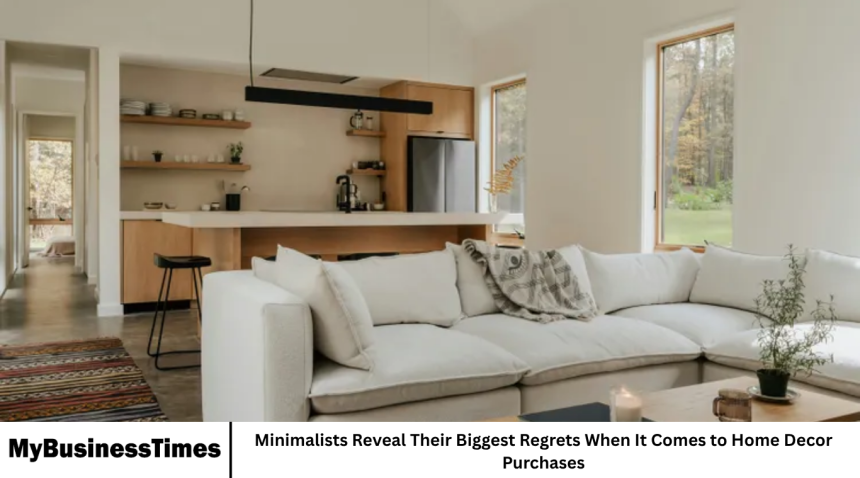Minimalism has become one of the most popular lifestyle choices in recent years, with people around the world embracing simplicity, functionality, and mindfulness. The philosophy centers on owning less and finding joy in what truly matters. Yet, even minimalists make mistakes when it comes to decorating their homes. While their focus is on thoughtful living, some purchases turn out to be unnecessary, impractical, or out of sync with their lifestyle. In this article, we explore what minimalists say are their biggest regrets when it comes to home decor purchases—and the lessons we can all learn from their experiences.
Oversized Furniture That Overwhelms the Space
Many minimalists admit they once bought large, bulky furniture pieces that dominated their rooms. At the time, the idea of a big couch or king-sized bed seemed luxurious, but these items often made spaces feel cramped and less functional. Minimalism thrives on open areas and easy movement, which oversized furniture can hinder.
Some minimalists now opt for compact, modular furniture that fits their space without crowding it. They’ve learned that comfort does not always require size and that less can indeed be more when it comes to design and usability.
Trendy Decor That Quickly Felt Outdated
Trends come and go, but minimalism focuses on timeless appeal. Several minimalists shared that they regretted following short-lived design fads—such as neon signs, geometric patterns, or metallic finishes. While these items looked appealing on social media, they quickly lost their charm and cluttered their once-calm spaces.
The lesson they learned is to invest in decor with lasting value. Neutral tones, natural textures, and classic designs maintain harmony and don’t demand constant updates. Staying true to personal taste instead of chasing trends helps create a space that feels both current and authentic.
Excessive Wall Art and Decor Pieces
Even minimalists sometimes fall into the trap of over-decorating walls. What starts as a few art pieces can turn into a crowded gallery, making the space feel visually noisy. Many admitted they initially thought adding more art would make their homes look sophisticated but soon realized it did the opposite.
Now, they prefer a “less is more” approach—choosing one or two meaningful artworks that draw attention without overwhelming the eye. A single painting or a minimalist photograph can add character while maintaining balance.
Decorative Items Without Purpose
One of the most common regrets minimalists shared is buying decor items that serve no real purpose. From fancy vases that collect dust to decorative bowls that remain empty, these items often contribute to clutter instead of enhancing the environment.
The minimalist principle encourages function over form. Today, many prefer multi-purpose decor—such as elegant storage baskets, sleek lamps, or minimalist clocks that add beauty while serving a clear purpose.
Cheap Impulse Buys
Sales and discounts can tempt even the most disciplined minimalist. Some confessed that they purchased inexpensive home decor items just because they were on sale. However, these impulse buys often didn’t match the rest of their interiors or ended up unused.
Minimalists emphasize quality over quantity. Buying fewer but well-made items creates a cohesive look and lasts much longer. The lesson: patience and intentionality pay off more than quick bargains.
Overly Minimal Spaces That Felt Cold
While clutter can create chaos, an overly empty space can feel unwelcoming. A few minimalists admitted that in their effort to eliminate unnecessary items, they stripped away warmth and comfort. Their homes began to feel sterile rather than peaceful.
Now, they incorporate soft textures, warm lighting, and personal touches—like plants or cozy throws—to add life to their homes while keeping the minimalist spirit alive. Minimalism doesn’t mean emptiness; it means thoughtful simplicity.
Ignoring Personal Style for Aesthetic Perfection
In pursuit of the perfect minimalist aesthetic, some people lost sight of their personality. They focused too much on achieving a “picture-perfect” home instead of creating a space that reflected who they are. Minimalists now emphasize that a home should feel lived-in and personal, not like a showroom.
By integrating sentimental objects and meaningful colors or textures, they have found ways to make their spaces both minimalist and expressive. The key is balance—keeping simplicity while celebrating individuality.
Lack of Storage Solutions
Minimalism encourages fewer possessions, but it also values smart organization. Many minimalists regret not investing in sufficient storage options early on. Without proper storage, even a few items can create visible clutter, disrupting the flow of the space.
Modern minimalists now prefer built-in storage, hidden drawers, and multi-functional furniture. These help keep essentials out of sight while preserving a clean, open look.
Poor Lighting Choices
Lighting plays a major role in how a minimalist home feels. Some minimalists regret using harsh or dim lighting that made their homes either too sterile or too gloomy. Minimalism works best when spaces are bright, natural, and inviting.
They now recommend investing in layered lighting—combining natural light, floor lamps, and soft LED fixtures. This approach adds warmth and depth without cluttering the visual space.
Buying Decor Before Understanding the Space
Many minimalists revealed that their biggest mistake was purchasing decor before fully living in or understanding their home. They bought items based on imagination rather than real needs. As a result, they ended up with pieces that didn’t fit the space or match its flow.
The wiser approach, they say, is to wait. Living in a space for a while helps reveal what truly enhances it and what is unnecessary. Mindful observation leads to better, more purposeful decisions.
Overlooking Comfort for Aesthetic Value
Minimalism often emphasizes clean lines and sleek designs, but some minimalists realized they sacrificed comfort in the process. Chairs that looked beautiful were uncomfortable, and couches were too firm to relax on.
They learned that function and comfort should always come before visual appeal. A minimalist home should feel calm and livable, not just visually pleasing. Comfort, after all, is part of what makes a space truly minimal—free from discomfort or distraction.
Neglecting Color and Texture
A few minimalists regretted going too far with neutral tones, ending up with spaces that looked monotonous. While whites, grays, and beiges create serenity, an all-neutral palette can lack warmth.
Now, many add subtle pops of color or texture—like wooden accents, woven fabrics, or green plants—to bring depth and interest without clutter. Thoughtful contrast helps maintain balance while avoiding visual fatigue.
Forgetting Practicality in the Kitchen and Bathroom
Kitchens and bathrooms often reveal the biggest decor regrets. Minimalists noted that while they aimed for clean, uncluttered counters, they sometimes removed essential tools and storage. This made daily routines less efficient.
They’ve since learned to blend minimalism with practicality. Hidden storage, wall-mounted racks, and compact containers help maintain cleanliness while ensuring functionality.
Learning from Regret: The Essence of Mindful Design
Every regret shared by minimalists points to a common theme—mindfulness. The heart of minimalism lies not in how little you own but in how intentionally you live. Each object should have purpose, meaning, and harmony with the rest of the space.
Their reflections remind us that minimalism is not about strict rules or deprivation. It’s about thoughtful choices that enhance both lifestyle and environment. Mistakes, after all, are part of the process of discovering what simplicity truly means.
Frequently Asked Questions
What do minimalists regret most about their home decor choices?
Many minimalists regret buying trendy, oversized, or purely decorative items that don’t serve a real purpose or fit their lifestyle.
How can I avoid making similar mistakes in my home decor?
Take time to understand your space, focus on function, and choose timeless pieces over trend-driven designs. Avoid impulse buying and prioritize comfort.
Can minimalism still feel cozy and warm?
Yes. Adding natural textures, soft lighting, and personal elements can create warmth while keeping a clean, uncluttered aesthetic.
Is it okay for minimalists to have decorative items?
Absolutely. The key is to choose decor that adds meaning or functionality. Minimalism doesn’t reject beauty—it celebrates simplicity with intention.
What’s the main lesson from minimalists’ home decor regrets?
Mindful living is more valuable than perfection. Every piece in your home should contribute to comfort, function, or joy without creating unnecessary clutter.
Conclusion
Minimalism is a journey of balance, not perfection. The regrets shared by minimalists—whether oversized furniture, trend-driven purchases, or overly sparse designs—highlight the importance of intentional living. A minimalist home should feel calm, comfortable, and personal.
Ultimately, the best decor decisions come from self-awareness and patience. By learning from these experiences, anyone can create a home that is both simple and fulfilling—a reflection of clarity, not emptiness.









